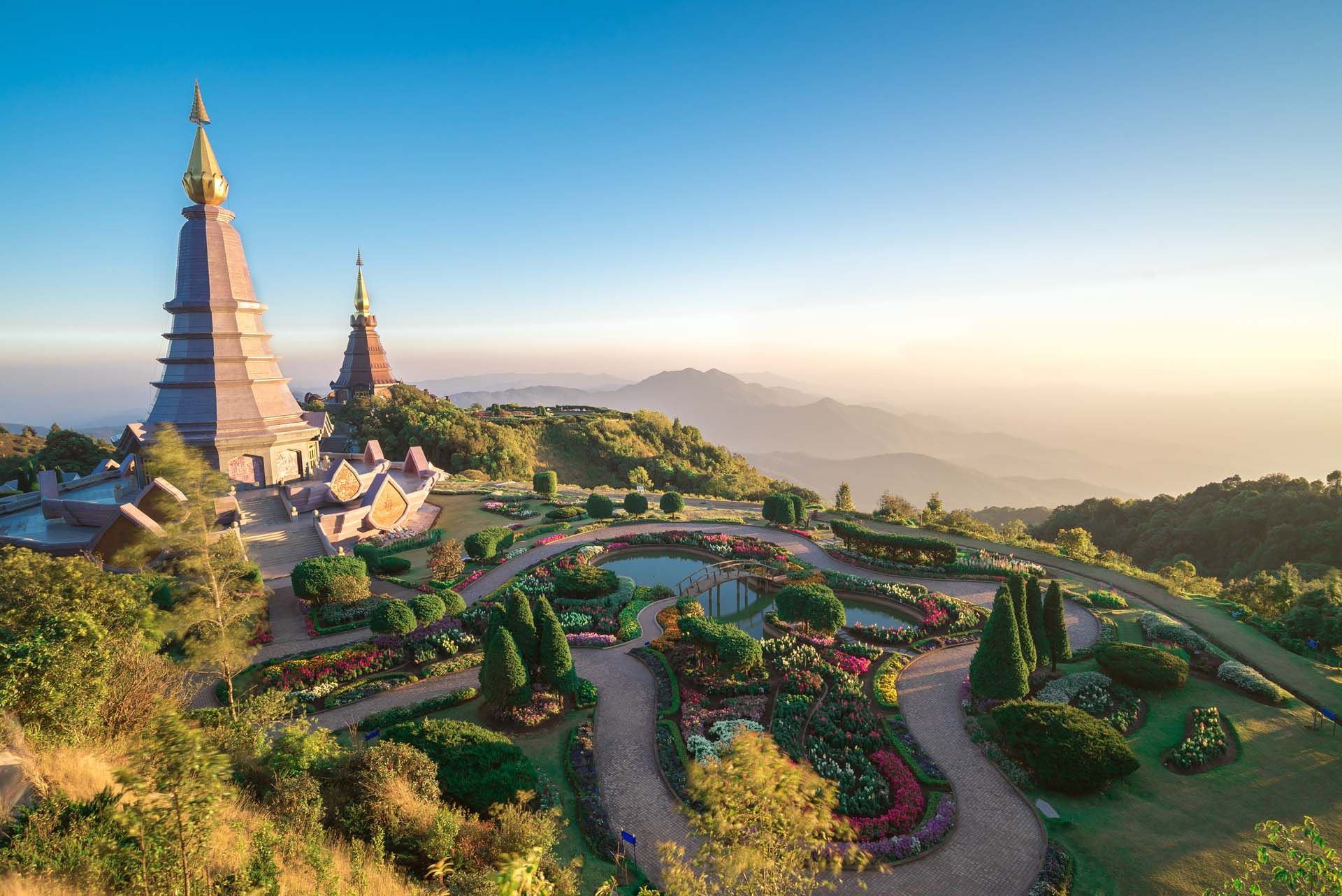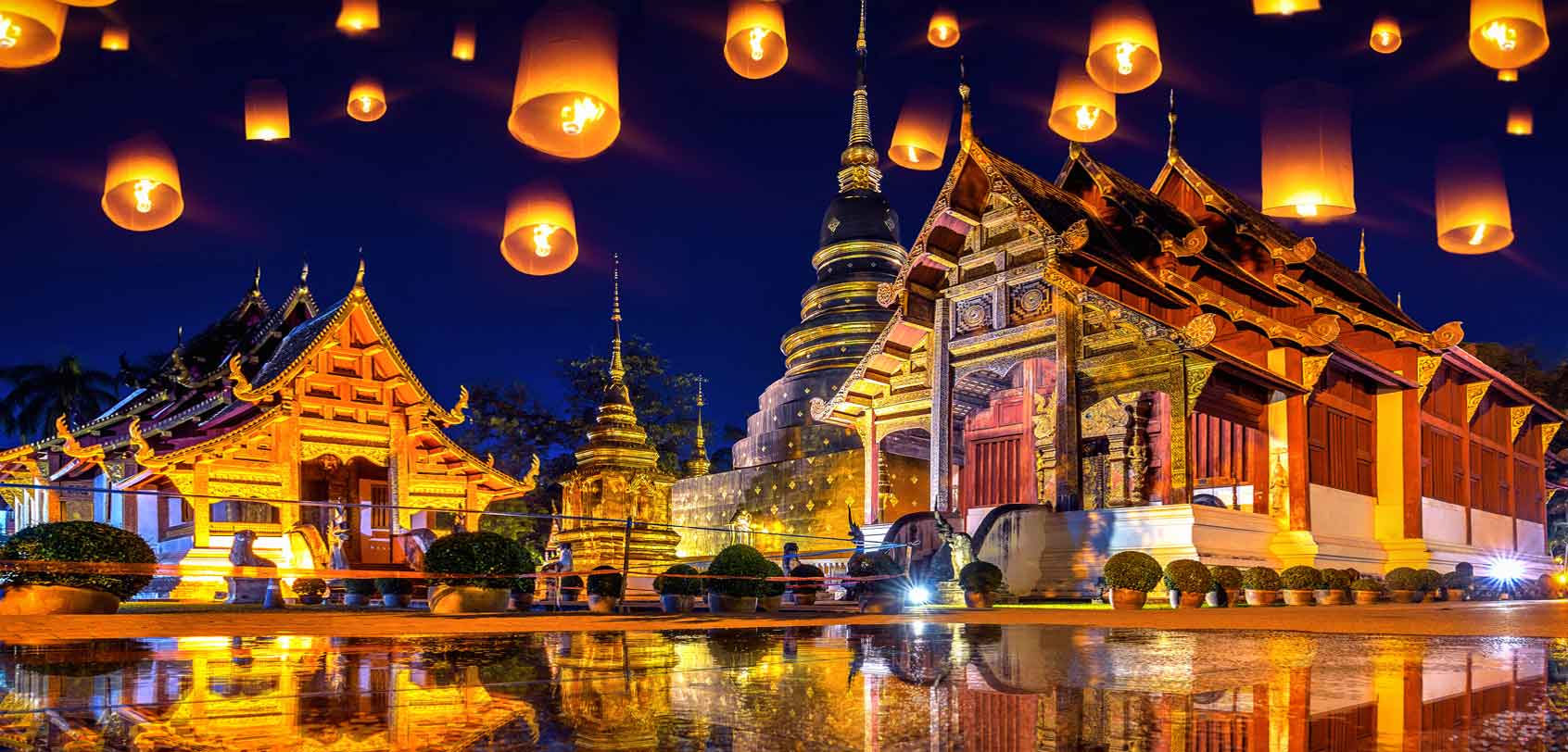
Chiang Mai, the "Rose of the North," is a city that effortlessly blends ancient traditions with modern comforts. Nestled amidst lush mountains and fertile valleys, it’s a haven for travelers seeking a taste of authentic Thai culture, breathtaking natural beauty, and a relaxed, welcoming atmosphere. More than just a destination, Chiang Mai is an experience – a journey that will leave you refreshed, inspired, and yearning to return.
A Glimpse into the Past: History and Heritage
Chiang Mai’s history is as rich and vibrant as its cultural offerings. Founded in 1296 by King Mengrai, it served as the capital of the Lanna Kingdom, a powerful and independent state that flourished for centuries. The city’s strategic location along trade routes contributed to its prosperity, attracting merchants, artisans, and Buddhist scholars.
/chiang-mai-thailand-temple-586d66e03df78c17b6e0880a.jpg)
Related Articles about Chiang Mai: A Traveler’s Guide to Northern Thailand’s Rose:
- Russia: A Timeless Tapestry of History, Culture, and Adventure
- Tokyo: A Metropolis of Enchantment – Your Ultimate Travel Guide
- Beyond the Tulips and Windmills: A Comprehensive Guide to Experiencing the Netherlands
- Germany: A Tapestry of Timeless Charm and Modern Marvels
- Kuala Lumpur: A Tapestry of Tradition and Tomorrow
The influence of the Lanna Kingdom is still palpable today. The ancient city walls and moats, remnants of its fortified past, encircle the Old City, a UNESCO World Heritage site. Inside, you’ll find a treasure trove of historical temples (Wats), each with its unique architectural style, intricate carvings, and shimmering golden stupas.
In the 16th century, Chiang Mai came under Burmese control, a period of hardship and decline. However, in the late 18th century, the Siamese (Thai) kingdom reclaimed the city, ushering in a new era of prosperity. Chiang Mai then evolved into a major trading center, attracting both Thai and foreign traders.
Today, the city’s historical legacy is woven into the fabric of daily life. The traditional Lanna culture, with its distinct language, cuisine, and arts, continues to thrive, adding to the city’s charm and authenticity.
Top Attractions: Exploring the Wonders of Chiang Mai
Chiang Mai boasts a diverse range of attractions that cater to every interest. Here are some of the must-see sights:
1. Temples (Wats): The Heart of Chiang Mai
- Wat Phra That Doi Suthep: Perched atop Doi Suthep mountain, this iconic temple offers stunning panoramic views of Chiang Mai and the surrounding countryside. The climb to the temple, via a winding staircase adorned with Naga serpents, is an experience in itself. The temple’s golden chedi (stupa) is a breathtaking sight, especially at sunrise or sunset.
- Wat Chedi Luang: Located in the heart of the Old City, this temple is famous for its massive, partially ruined chedi, a testament to the city’s historical grandeur. The temple complex also houses a revered Emerald Buddha replica.
- Wat Phra Singh: Known for its beautifully crafted architecture and the Phra Singh Buddha image, one of the most revered Buddha statues in Thailand.
- Wat Umong: A unique forest temple with a network of tunnels and meditation chambers, providing a serene escape from the bustling city.
- Wat Sri Suphan (Silver Temple): A striking temple crafted almost entirely from silver, showcasing intricate silver carvings and a unique architectural style.

2. Natural Wonders: Embracing the Outdoors
- Doi Inthanon National Park: Home to Thailand’s highest peak, Doi Inthanon is a haven for nature lovers. Explore lush rainforests, cascading waterfalls (Wachirathan Falls, Sirithan Falls), and diverse wildlife. Visit the Royal Pagodas, built in honor of the King and Queen, for breathtaking views.
- Elephant Sanctuaries: Chiang Mai is renowned for its ethical elephant sanctuaries, offering a chance to interact with these magnificent creatures in a responsible and sustainable way. Choose sanctuaries that prioritize the elephants’ well-being and allow them to roam freely.
- Tiger Kingdom: A controversial attraction, the Tiger Kingdom allows visitors to interact with tigers. Research and choose carefully, as some ethical concerns exist.
- Doi Pui National Park: A perfect spot for hiking, trekking, and enjoying scenic vistas. You can visit Hmong hill tribe villages, waterfalls, and viewpoints.
3. Cultural Experiences: Immersing Yourself in Tradition
- Night Bazaar: A vibrant market offering a wide array of goods, from handicrafts and clothing to souvenirs and delicious street food. Haggle for the best prices and soak in the lively atmosphere.
- Sunday Walking Street (Sunday Market): A bustling pedestrian-only market in the Old City, filled with local artisans, street performers, and delicious food stalls.
- Cooking Classes: Learn to prepare authentic Thai dishes with hands-on cooking classes. Choose from a variety of classes, from basic courses to advanced culinary experiences.
- Thai Massage: Indulge in a traditional Thai massage, known for its therapeutic benefits and relaxation.
- Lanna Cultural Performances: Witness captivating performances showcasing traditional Lanna dance, music, and storytelling.
- Wat Phan Tao: A beautiful wooden temple that often hosts meditation retreats and cultural events.
- Visit Hill Tribe Villages: Explore the diverse cultures of the hill tribes surrounding Chiang Mai. (Be mindful of ethical tourism practices and respect local customs.)
4. Adventure Activities: For the Thrill-Seekers
- Ziplining: Soar through the rainforest canopy with thrilling zipline adventures.
- White Water Rafting: Experience the excitement of white water rafting on the Mae Taeng River.
- ATV Riding: Explore the scenic countryside on an ATV adventure.
- Rock Climbing: Challenge yourself with rock climbing at various locations around Chiang Mai.
- Biking: Rent a bicycle and explore the city and surrounding areas at your own pace.
Travel Tips: Navigating Chiang Mai with Ease
- Visa: Check visa requirements based on your nationality. Most nationalities can enter Thailand visa-free for a certain period.
- Currency: The Thai Baht (THB) is the official currency. ATMs are readily available throughout the city.
- Language: Thai is the official language. English is widely spoken in tourist areas.
- Transportation:
- Tuk-tuks: Iconic three-wheeled vehicles, ideal for short distances. Negotiate the price beforehand.
- Songthaews (Red Trucks): Shared taxis that operate on fixed routes. Wave one down and tell the driver your destination.
- Taxis: Metered taxis are available, but ensure the meter is used.
- Grab: A ride-hailing app, similar to Uber, that is widely available.
- Motorbike Rentals: A popular and convenient way to explore the area, but only if you have a valid international driving license and are comfortable driving on the left side of the road. Wear a helmet at all times.
- Bicycle: A great way to explore the Old City and surrounding areas.
- Bargaining: Bargaining is common at markets and for some services (tuk-tuks, taxis).
- Dress Code: Dress respectfully when visiting temples. Shoulders and knees should be covered.
- Safety: Chiang Mai is generally a safe city. However, be aware of your surroundings and take precautions against petty theft, especially in crowded areas.
- Health: Drink bottled water. Be aware of the sun’s intensity and wear sunscreen. Consider vaccinations and consult your doctor before traveling.
- Electricity: Thailand uses 220V, with Type A, B, and C plugs. Bring an adapter if necessary.
- Respectful behavior: Show respect for Thai culture and traditions. Avoid public displays of affection and speak quietly in temples.
Accommodation Options: Finding Your Perfect Stay
Chiang Mai offers a wide range of accommodation options to suit every budget and preference:
- Luxury Hotels: Experience opulent stays in world-class hotels with stunning views, luxurious amenities, and exceptional service.
- Boutique Hotels: Stay in charming boutique hotels with unique designs, personalized service, and a more intimate atmosphere.
- Guesthouses: Enjoy budget-friendly stays in guesthouses, often run by local families, offering a friendly and authentic experience.
- Hostels: Meet fellow travelers and enjoy affordable accommodation in hostels with dorm rooms and private rooms.
- Villas and Apartments: Rent private villas or apartments for a more independent and comfortable stay, especially for families or groups.
Areas to Consider:
- Old City: The heart of Chiang Mai, with easy access to temples, markets, and cultural attractions.
- Nimmanhaemin Road: A trendy area with cafes, restaurants, bars, and boutiques.
- Riverside: Enjoy scenic views of the Ping River and a more relaxed atmosphere.
- Suthep Road: Close to Doi Suthep temple and offers a quieter setting.
Transportation in Chiang Mai: Getting Around with Ease
Navigating Chiang Mai is relatively easy and affordable. The transportation options available include:
- Tuk-Tuks: Ideal for short trips, these three-wheeled vehicles are a fun and iconic way to get around. Agree on a price before you go.
- Songthaews (Red Trucks): Shared taxis that follow fixed routes. Wave one down and tell the driver your destination. Prices are very affordable.
- Taxis: Metered taxis are available, and Grab (ride-hailing app) is a convenient alternative.
- Motorbike Rentals: A popular option for exploring the surrounding areas. However, only rent if you have a valid international driving license and are comfortable driving on the left side of the road. Always wear a helmet.
- Bicycle: A great way to explore the Old City and surrounding areas.
- Walking: The Old City is easily walkable, allowing you to explore at your own pace.
Best Time to Visit: Weather and Crowds
The best time to visit Chiang Mai is during the cool and dry season, from November to February. The weather is pleasant, with comfortable temperatures and low humidity, making it ideal for outdoor activities.
- November to February: Peak season. Expect the best weather with cooler temperatures and minimal rain. This is also the busiest time, so book accommodations and tours in advance.
- March to May: Hot season. Temperatures can soar, and humidity levels increase. It’s still a good time to visit, but be prepared for the heat.
- June to October: Rainy season. Expect frequent rainfall, but the landscape is lush and green. This is a less crowded time to visit, and prices for accommodations and tours may be lower.
Conclusion: A Journey to Remember
Chiang Mai offers an unforgettable travel experience, a perfect blend of culture, nature, and adventure. From the ancient temples and bustling markets to the stunning natural beauty of the surrounding mountains, Chiang Mai is a city that will captivate your senses and leave you with lasting memories. Plan your trip, embrace the local culture, and prepare to be enchanted by the "Rose of the North."





